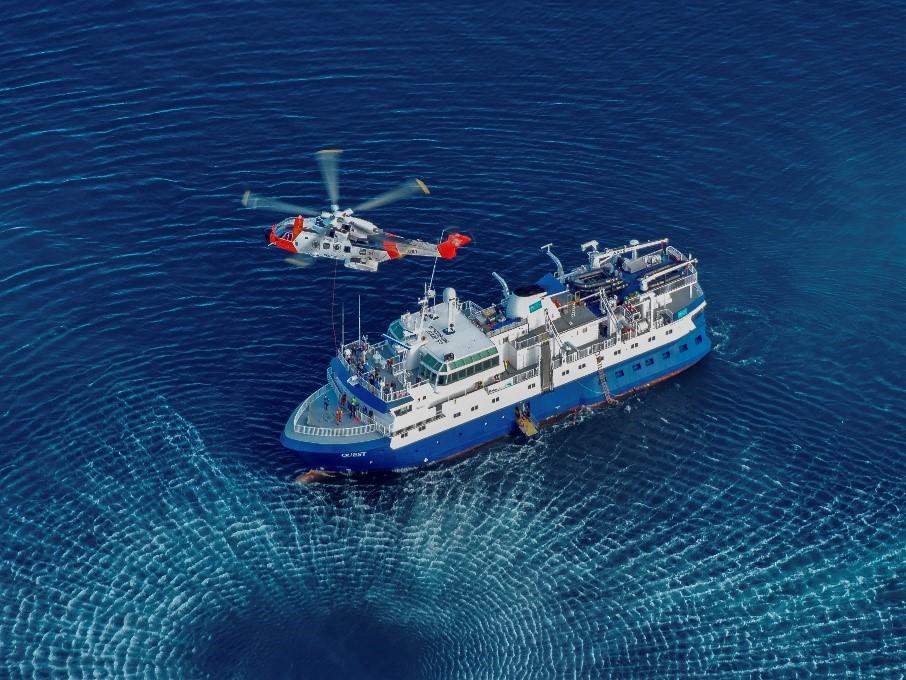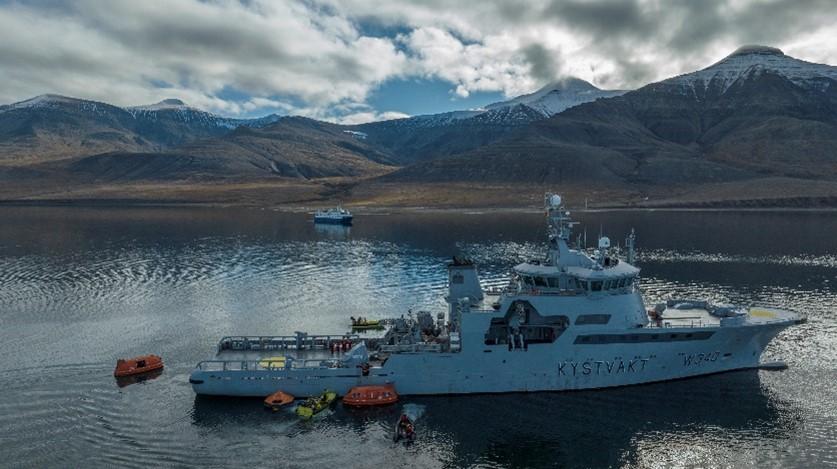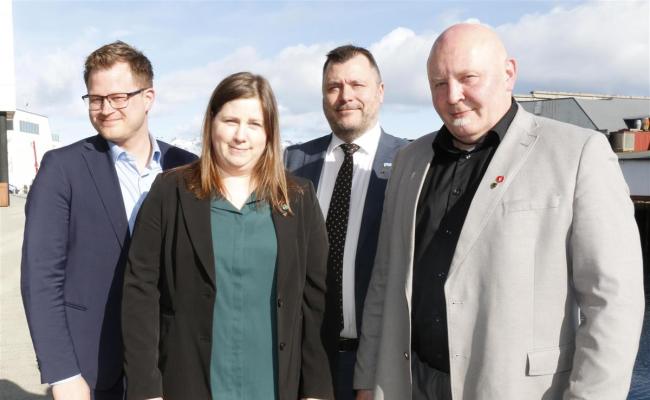Op-ed: Strengthened Emergency Preparedness in the Arctic and North Atlantic

The ARCSAR project carried out a mass rescue operation exercise called "ARCSAR LIVEX 2022" in Svalbard, Norway, onboard the expedition cruise vessel MS "Quest". (Photo: Anders Martinsen, UAS Norway)
Safe commercial activity in the Arctic and North Atlantic region requires close international collaboration between key partners in the security and emergency response field. The ARCSAR project has succeeded in just that.
This is an op-ed written by an external contributor. The article expresses the writer's opinions. High North News is not responsible for the content of external links.
The Arctic and North Atlantic region is characterized by low‐density population areas, challenging resource infrastructure, limited medical capacity, a diverse and often extreme climate, and ocean areas bordered by cliffs, fjords, and mountains that are difficult to access.
The region has traditionally been involved in economically important fisheries, maritime traffic, research, and tourism activities. The area is experiencing more attention, increasing traffic and human activity.
Various initiatives are executed worldwide to strengthen emergency preparedness capacity in complex environments. One such initiative is the “Arctic and North Atlantic Security and Emergency Preparedness Network» (ARCSAR) project.
The ARCSAR project was funded by the EU Framework Programme for Research and Innovation Horizon 2020 and finished in February 2024. The Joint Rescue Coordination Centre Norway led the project.
To achieve this ambitious goal, the ARCSAR project carried out a series of important project actions. The goal was to unite security and emergency response practitioners, academia and research centers, industry, and authorities involved in governance and policymaking in the field of emergency preparedness.

The ARCSAR LIVEX 2022 exercise contributed to an enhanced understanding of factors that affect survivability and decision-making in the Arctic and North Atlantic region, as well as the main steps and challenges associated with transferring passengers between ships at sea. (Photo: Anders Martinsen, UAS Norway)
Key results
One of the key project results is practitioner-led guidelines and best practices, the establishment of an innovation platform for security and emergency response institutions in the Arctic and North Atlantic region, and an expanded collaborative network of 99 international partners representing 22 countries.
Another important project outcome is a better understanding of target areas for improvements in security and emergency capabilities across the Arctic and North Atlantic region, also via mapping the needs for response measures in different emergencies.
In addition to the above, the ARCSAR project contributed to the identification of critical barriers and gaps in the capacity, competence, and infrastructure of professional security and emergency response practitioners through close interaction across operational areas.
The results of this work were presented in a special report on the uptake of innovation, research, and knowledge and identified barriers to innovation uptake.
The ARCSAR project was the first EU-funded network of its kind.
It aimed to strengthen preparedness in the Arctic and North Atlantic region through the uptake of existing innovations and knowledge by emergency practitioners, predict future needs for innovation and knowledge, and identify priorities for security and standardization across the region.
The ARCSAR project contributed to the identification of critical barriers and gaps in capacity, competence and infrastructure of professional security and emergency response practitioners.
NORDLAB cooperation
The Center for Crisis Management and Collaboration (NORDLAB) contributed to several of these deliverables, reports, conferences, and exercises, including arranging and participating in knowledge exchange events in Iceland, New Zealand, and online during the pandemic.
NORDLAB also hosted a discussion-based tabletop exercise, “Oil in Ice,” in 2021. The exercise was developed in close cooperation with the Norwegian Coastal Administration, Joint Rescue Coordination Centre Norway, and the Icelandic Coast Guard and was a hybrid format that included role-play and simulator-based visualization.
The training audience included authorities, responders, and other stakeholders who are directly involved in the marine environmental response in Svalbard and other Arctic and North Atlantic countries.
Mass rescue operation exercise
One of the most important project events was a mass rescue operation exercise, “ARCSAR LIVEX 2022”, in Svalbard (Norway) on board an expedition cruise vessel, MS Quest, chartered by one of the consortium members, Polar Quest.
Over four days, participants carried out various exercises, lectures, and tests of new technologies, such as emergency beacons utilizing the Galileo SAR/COSPAS-SARSAT system with both forward and return links tested by the Norwegian Space Agency and European Union Agency for the Space Programme.
On the final day, a live mass rescue exercise took place with fire onboard MS Quest, with a rescue operation involving the Norwegian Coast Guard vessel “Barentshav” and the SAR Queen helicopter from Banak.
This incident represented a worst-case scenario for the cruise sector and the rescue services. Such an incident would require the rapid evacuation of a large number of people in highly remote areas in a cold climate, with significant limitations on survival time.

NORDLAB also hosted a discussion-based tabletop exercise, “Oil in Ice,” in 2021. The exercise was developed in close cooperation with the Norwegian Coastal Administration, Joint Rescue Coordination Centre Norway, and the Icelandic Coast Guard in a hybrid format including roleplay and simulator-based visualization. (Photo: NORDLAB)
This live exercise contributed to enhanced understanding of factors that affect survivability and decision-making in the Arctic and North Atlantic region, as well as the main steps and challenges associated with transferring passengers between ships at sea. And most importantly, it strengthened collaboration, trust, and cooperation procedures between the responding parties.
Researchers from the Center of Crisis Management and Collaboration - NORDLAB were part of the exercise evaluation team.
The ARCSAR project successfully fulfilled its mission to contribute in a unique way to the existing efforts in the region, while ensuring a wide variety of viewpoints, experiences and perspectives are brought to bear on issues of Arctic and North Atlantic safety and security.
There is still a potential for further research and collaborative efforts of practitioners, academia, industry, and authorities in the field of emergency preparedness. We believe that the established partnership, innovation platform and network will continue functioning, and we are gaining momentum towards further collaboration on behalf of safe maritime operations in the Arctic and North Atlantic region.





